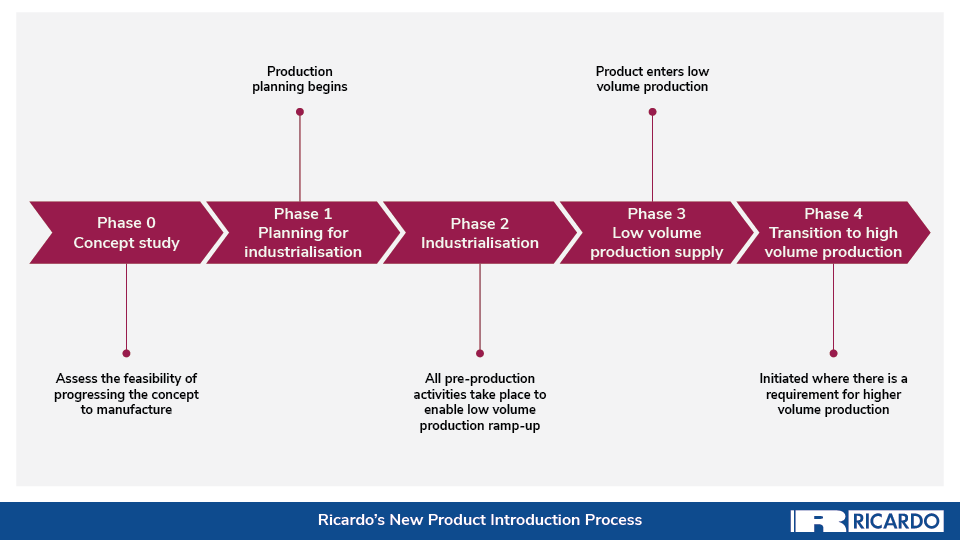
Guide to the New Product Introduction (NPI) process
01 Jan 2023
All manufacturing enterprises that sell their own technology – from batteries to high performance vehicles – must bring new products to market to keep ahead competitively. The success of such projects depends on careful planning and implementation in areas from design drawings through to supply chain management and industrialisation. A New Product Introduction (NPI) strategy manages these activities as part of an overarching plan.
What is the New Product Introduction process?
NPI is a proven, systematic, and repeatable process of taking a product from concept to its final form, carried out from the manufacturer’s perspective. It helps growing businesses bring new products to market efficiently, quickly, and cost-effectively without falling into the known traps often encountered when trying to ramp up and scale production.
The goals of the NPI process are to enhance quality, increase production efficiency, reduce risks, minimise waste, improve speed to market and save money through the application of real-world knowledge and experience.
Got more questions about NPI? Check out our knowledge hub which has frequently asked questions and expert advice on all aspects of getting you product to market. Or download our quick start guide for free.
Download our get started guide
Why implement a New Product Introduction process for low volume manufacture?
Implementing a New Product Introduction process is widely recognised as a way of ensuring the launch success of niche volume and highly specialised products.
The process is considered sector-agnostic and being applied across businesses as diverse as energy provision, medical equipment and food and beverages. It is also enabling greener, more sustainable products, from batteries to complete hybrid and electric vehicles.
The benefits of implementing a New Product Introduction strategy include:
- Reduced risk
- Lower development cost
- Lower production costs
- Higher quality products
- Improve quality control
- Reduce time to market
- Easier to scale up production
- Easier to manage product variation

The Ricardo New Product Introduction Process
Ricardo’s New Product Introduction Process is made of up 5 stages.
We start by meeting with you to discuss your problem or plan for manufacturing, then discuss our capabilities – and illustrate these with case studies. We work collaboratively with you, to understand the challenge and develop a solution ready for you to implement, or for us to fulfil if you prefer.
NPI Phase 0: Concept Study
At the concept phase, we assess the feasibility of progressing the concept to manufacture. This will give a clear indication of launch readiness. At this early stage, we appraise the key manufacturing requirements including a review of processes, supply chain and risks.
Completing this early assessment will define the steps to be taken later in the programme. It will ensure that early design concepts are aligned with the available manufacturing technology to minimise design re-work at later stages.
At this stage we:
- Gain an understanding of the product and assembly fundamentals and support the engineering design concept phase, with design for manufacture and design for assembly (DFMA).
- Develop a high-level plan for industrialisation
- Generate a high-level bill of materials (BOM) structure aligned to the potential supply chain and assembly process.
- Develop a high-level assembly, quality, and end of life (EOL) plan
- Generate a manufacturing strategy content structure and commence a product ‘risk register’.
NPI Phase 1: Planning for Industrialisation
This is the phase where production planning begins. This covers everything from assembling a project team to planning out investment requirements.
At this stage we:
- Assemble a critical function leadership team to ensure all elements of the production plan on the critical path are given direction and priority
- Engage the supply chain to ensure sufficient volume and run rate capabilities exist to support the production volumes
- Assess the supply chain can meet the product quality requirements
- Characterise online assembly and End-of-Life methodologies
- Qualify the investment required to bring the product to market
- Assess requirements for supplier tool and assembly facilities
- Create a pricing model for low volume production
- Provide support for the initial engineering design – covering DFMA and failure mode and effects analysis (FMEA).
Learn more about building quality assurance into your supply chain
NPI Phase 2: Industrialisation
The industrialisation phase is where all pre-production activities take place to enable low volume production ramp-up. The production facility will be ramping up in capability during this phase in preparation for the production kick-off. Designs are typically frozen at this point in readiness for start of production.
At this stage we:
- Implement Advanced Product Quality Planning (APQP) for component quality and process control
- Implement final process failure mode effects analysis (FMEA)
- Nominate suppliers and confirm the supply chain
- Place low-volume production supply contracts
- Implement a facility to allow prototype build and validation support
Got a question about the industrialisation process? Our team of industrialisation consultants can help.
Industrialisation consultancy services
NPI Phase 3: Low Volume Production Supply
Phase 3 is where the product enters low volume production. For many of our niche manufacturing clients this will be the final phase of the New Product Introduction process.
By this point all processes will have been implemented to ensure production quality is of the highest standard and that the supply chain is fully validated and prepared for launch. The facility is commissioned and handed over to enable ramp-up and training.
At this stage we:
- Commission and hand over the facility
- Set up a standard operation procedure (SOP 90+)
- Provide training and support to ensure a smooth handover
- Establish management of the supply chain and facility logistics
- Establish management of configuration control from BOM to production specification
- Continue to engage with the product engineering team to ensure the bill of materials is aligned with the final product specification
- Maintain component and system traceability while units are assembled and supplied in line with agreed weekly schedules
- Can assess any requirement for high volume production ramp up
Learn more about how to scale up your production safely and effectively
NPI Phase 4: Transition to High Volume Production
Phase 4 is initiated when there is a requirement for higher volume production.
At this stage we:
- Ensure that production supply is maintained to anticipated levels, while avoiding conflict in the supply chain.
- Share best practice and experience
- Phase out low volume capability whilst supporting phase-in of high-volume capability,
- Support recertification of APQP activities
- Support your contracts with Tier 1 suppliers
Four key skills required for New Product Introduction process success
There are four key skills that ensure that manufacturing is planned effectively:
- Process engineering
- Design for assembly
- Quality management
- Supply chain management
It is essential that these are deployed to ensure that the NPI process is successful, particularly for companies producing complex products at niche volumes. This reduces risk as well as the requirement for long-term investment in manufacturing facilities and technology.
The Ricardo team ensure that these core skills are weaved through our New Product Introduction process to ensure the success of our clients’ products.
- Process engineering
By applying processes from high-volume manufacturing environments to niche volume manufacturing, we ensure tight control and on-time, in specification and fault-free products. This ensures the manufacturing facility operates in a controlled and repeatable way, delivering high quality products throughout their lifecycle.
- Design for assembly
Consideration of assembly requirements at a very early stage will ensure long-term improvement in both the efficiency of the production output and the product’s profitability, minimising investment at the production launch phase.
- Quality management
The application of a ‘total quality’ methodology is essential for many industries with defined standards in place. This involves working internally and externally to deliver Advanced Product Quality Planning (APQP), Production Part Approval Process (PPAP) and International Material Data System (IMDS) documentation. These requirements can prove challenging for manufacturers operating at niche volumes but the ability to implement them can lead to success. Our experts support our clients in implementing these requirements.
- Supply chain management
Large-scale manufacturers focus strongly on development and management of their supply chain. Start-ups and smaller organisations are unlikely to have the buying power or skills to manage a complex supply chain for their component and system parts. Ricardo apply a thorough supply chain quality management methodology and can deliver significant efficiency benefits while reducing the ongoing product cost for our clients.
A tailored approach to New Product Introduction for niche volume, specialist products
Our first-hand experience in niche volume, high-quality manufacturing, and assembly programmes for the most demanding automotive and motorsport sectors has taught us that there is no ‘one-size-fits-all’ approach to NPI. That is why we tailor our approach to New Product Introduction according to the requirements of our clients and their products.
Whether you just need a quick process to get up and running, or some supply chain management guidance. The process can address the whole package, or just one element of it. Our support is both commercial and technical: combining profound knowledge both of ‘nuts and bolts’ operational, manufacturing processes and strategic business insight.
Our niche New Product Introduction service will help your growing business to ramp up as quickly, effectively, and efficiently as possible, without compromising cost or quality; and to ‘de-risk’ that journey through the application of real-world knowledge and experience.




 Follow Ricardo plc for regular updates
Follow Ricardo plc for regular updates





